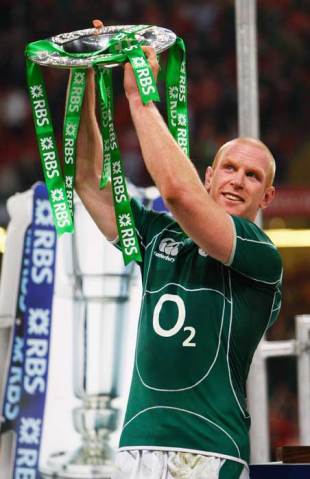|
British & Irish Lions
History favours O'Connell for Lions captaincy
Huw Richards
April 17, 2009

Could Ireland lock Paul O'Connell sample further glory this season by being named Lions skipper?
© Getty Images
Enlarge
History is on Paul O'Connell's side as the British and Irish Lions selectors weigh up their leadership options for the forthcoming tour of South Africa. As an Irishman and a second-row forward O'Connell combines the nationality and position likeliest to win what is generally regarded as the supreme accolade in British and Irish rugby. There have been 20 Lions tours since the Home Unions took responsibility for them in 1910. Seven earlier teams, starting with the commercial venture to Australia led by the ill-fated Bob Seddon and promoted by cricketers Alfred Shaw and Arthur Shrewsbury, selected both personnel and captain on a more informal basis. Nine of those 20 teams were led by an Irishman, and seven by a lock forward. It might seem odd that Ireland, historically the least successful of the four home nations with a losing record against each of its adversaries, should have supplied such a preponderance of captains. England have supplied five captains (counting Martin Johnson as two), Scotland four and Wales two. One explanation may be in the social composition of Irish rugby. It has proliferated in people, like doctors and army officers, whom selectors have been wont to see as the right sort of chap - in part because their jobs confer authority in early adulthood. And then there is that comparative lack of playing success. Lions selection was traditionally a politicised process, subject to horse-trading and a desire to avoid any one nation becoming too predominant. Only in 1959, and that only after Andy Mulligan was called up as a replacement scrum-half, has Ireland supplied the largest playing contingent. Wales, by contrast, provided the largest group of original selections for nine of the 11 Lions teams between 1950 and 1983. On the other two occasions, 1959 and 1983, it shared that distinction. One suggestion was that Welsh players were not always great tourists, more prone than most to home-sickness and sticking with their own national group. Sociology may also play its part - Phil Bennett (1977) is the only manual worker ever to have led the Lions. The consequence is the remarkable statistic that the South Wales clubs, without question the most powerful concentration of rugby talent in Britain between 1895 and 1995, provided only a single Lions captain - Bennett. Belfast's Instonians club by itself supplied two, Sam Walker (1938) and Robin Thompson (1955). Scotland's border clubs have been even more neglected. The predominant role has been taken over since 1989 by England, supplying around half of each of the five Lions parties who have travelled since. The choice of Martin Johnson as captain in both 1997 and 2001 reflected a change in approach that preceded professionalism with an insistence that, before anything else, the chosen leader should be a certainty for the test team. That limits shortlists severely and may mean that the two-tour leader like Johnson and, if he is chosen this time, Brian O'Driscoll, becomes a regular phenomenon. It certainly makes it unlikely that we'll again see captains like Ciaran Fitzgerald (1983) and Mike Campbell-Lamerton (1966), both army officers chosen for their leadership qualities when patently not the best players in their position, still less Doug Prentice (1930) who had played the last of his three games for England two years earlier, but was destined to become secretary of the Rugby Football Union. Choosing O'Driscoll would consolidate Leinster's hold as the single largest supplier of Lions leaders - before him came Tom Smyth (1910), Karl Mullen (1950), Ronnie Dawson (1959) and Fitzgerald. O'Connell would be the second Munsterman, following Tom Kiernan (1968) while Ulster has supplied three - Walker, Thompson and the incomparable Willie John McBride (1974). Fourteen of the 20 captains have been forwards, twelve drawn from the front five. This includes three Irish hookers - Mullen, Dawson and Fitzgerald - plus Walker, who propped in 1938 but had also hooked for Ireland. Four of the five English captains - Johnson (twice), Bill Beaumont (1980) and Ronnie Cove-Smith (1924) have been locks. O'Driscoll was only the second centre, following John Dawes (1971) to lead the Lions. There have been two back-rowers, Prentice and Finlay Calder (1989), two fullbacks in Kiernan and Gavin Hastings (1993) while Bennett represents outside-halves and Arthur Smith (1962) wingers. Scrum-half is the only position never so honoured, an omission that might have been rectified had the war not meant that Haydn Tanner went on his only Lions tour when only 22. The good news, with the choice apparently lying between a lock and a centre, is that these positions have supplied three of the four winning Lions skippers. Whoever gets the job will have as his sole ambition following in the footsteps of Dawes, McBride and Johnson (1997 edition) by returning from the southern hemisphere with a series win to his credit. © Scrum.com
|
Live Sports
Communication error please reload the page.
-
Football
-
Cricket
-
Rugby
-
- Days
- Hrs
- Mins
- Secs
F1 - Abu Dhabi GP
Abu Dhabi Grand Prix December 11-131. Max Verstappen ()
2. Valtteri Bottas (Mercedes)
3. Lewis Hamilton (Mercedes)
4. Alexander Albon ()
5. Lando Norris ()
6. Carlos Sainz Jr ()
-
ESPNOtherLive >>
Golf - Houston Open
Snooker - China Open
Tennis - Miami Open

